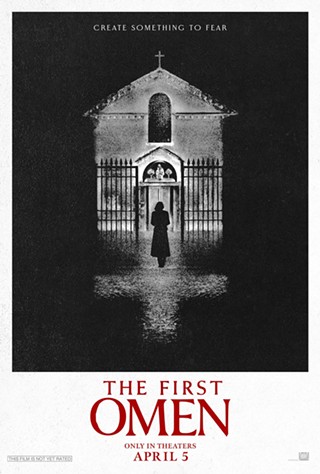Filmmaker Morgan Spurlock is a big-idea guy. Super Size Me asked what would happen if you ate nothing but fast food for a month. The answer was shocking, the impact of the film significant: McDonald's listened, wisely adopting a somewhat healthier menu; in fact, the Golden Arches became one of the 10 healthiest fast-food restaurants in the country by 2009, even beating Subway.
Where in the World Is Osama Bin Laden?, which is suddenly timely again, was another great idea: If the government can't track down public enemy No. 1, why can't a private citizen help? And now there is POM Wonderful Presents: The Greatest Movie Ever Sold, a case study of selling out a major motion picture—by selling out a major motion picture.
The problem for Spurlock, the big-idea guy, is that the devil is in the details. Super Size Me works because it's a concept based on its own finish line: Whatever the result turns out to be is the story. The other two films mentioned, though, have no ending. Where in the World doesn't work, because—in case you haven't heard—Morgan Spurlock isn't the guy who answered that question. And The Greatest Movie Ever Sold falls short as well, because showing a movie loaded with product placement to explain why movies are loaded with product placement has very little capacity to grow beyond its title.
It is, however, a pretty fun ride most of the way, and it's rather informative.
Spurlock's big idea is to have sponsors pay for his upcoming documentary, which, as he tells them, will be all about the marketing and advertising that happens on the screen in movies. And it's an epidemic, if you believe product placement is a bad thing: It was announced earlier this month that the next James Bond film has deals in place worth more than $45 million, or more than one-third of the budget.
So can art (if one can call it that) co-exist with commerce (one has no choice but to call it that)? In many respects, a lot of films are themselves advertisements for action figures, video games and even something called "books," independent of whether or not all the characters drink or wear or drive Brand X.
Spurlock finds out early that his sponsors, whom he attracts despite a lot of closed doors and unreturned phone calls, won't just give him money for the privilege of appearing in his film. Perhaps the producers of the 007 franchise—who have a lot of experience with this sort of thing, and happen to make an Aston Martin-load of money at the box office—don't have to deal with the small print in the contract, but Spurlock does: In order to get $1.5 million, Spurlock has to guarantee the title sponsor, POM Wonderful, more than a half-billion media impressions. (That makes two in this review already; things are looking up.)
If Spurlock's account of the contract is accurate, POM Wonderful (cha-ching!) won't ever have to pay him the $1.5 million: He must make $10 million in box-office receipts, which almost certainly won't happen; he has to sell a half-million DVDs or digital downloads, which is also a high number; and there are the 600 million impressions he has to give the sponsor online, on TV, in print and so on. So in reality, this was a shrewd move by the company, heavily stacking the deck in its favor: If Spurlock makes it all happen, it's an easy seven figures to spend on advertising; if not, it's still plenty of free advertising.
Other sponsors have their own demands, and after promising himself into a very narrow corner, Spurlock discovers that this strategy may not be a good one.
The filmmaker briefly investigates the history of product placement in movies and TV and explores why corporations like to tie Happy Meals or new car models to films. The answer was explained earlier, with POM Wonderful winning, no matter what. And while it's certainly a huge business, both the expenditures and the attention can have drawbacks. A little more than two years ago, GM significantly scaled back its partnership with the second Transformers movie, wisely thinking that a company which had just received a massive government bailout should not spend millions advertising new sports cars in a summer blockbuster.
Spurlock visits ad agencies, consumer advocates and public schools that are hard up for cash and could be a better target for ad dollars than movies, as well as researchers studying the impact of an immersion in advertising messages.
Unfortunately, as he did with Where in the World Is Osama Bin Laden?, Spurlock makes The Greatest Movie Ever Sold about himself more than the case he's investigating. What begins as a valid look at the proliferation of product placement in motion pictures turns into a story about how Morgan Spurlock deals with compromising his own integrity, and making a film fully supported by corporations that are upfront about expecting something in return.










